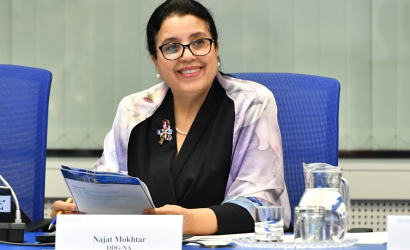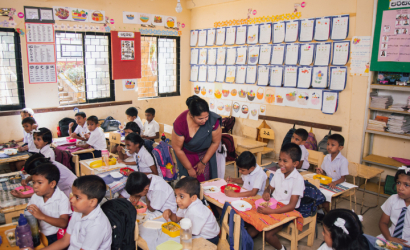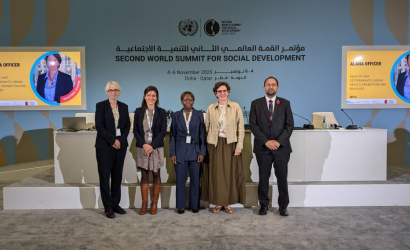What excites you most about UN Nutrition and being its first Executive Secretary?
UN Nutrition is uniquely positioned to strengthen UN’s leadership for nutrition. Governance for nutrition is complex because there are many actors. The huge number of actors is good in itself, but the UN, with its normative role should be a guiding beacon for the many actors in the nutrition landscape. The UN Nutrition members play a central role here. Being its first Executive Secretary feels like a real honour. This is a first time ever and the SC selected me to take on this important task. At the same time, it is not an easy time to start this new position. The year 2021 is marked by some major nutrition events, while a major actor, the SUN Movement and also UN Nutrition are in transition. There are many moving parts. So, our new secretariat for UN Nutrition needs to find a way to accommodate for both the major events and the moving parts. At the same time, the nutrition challenge is growing. Over the last few years, malnutrition levels have been increasing, exacerbated by the COVID-19 pandemic in the last year and half. In the end, we need to have impact at country level. Whatever is happening during or at global events, should just be a prelude for country-level action and impact, especially in those countries and for those groups that seem to be lagging behind.
Where/How do you think UN Nutrition can add value to what its member agencies are already doing?
It is the togetherness of UN Nutrition that matters, the whole is bigger (and different) than the sum of the parts. The unique mandates of the agencies bring forth valuable expertise in their specific areas. And bringing together that expertise in support of the joint objective to eliminate all forms of malnutrition is the best chance we have to be successful in this complex assignment.
Tell us about 3 new things or ways of working that UN Nutrition has/will take on to foster increased coherence in the support that the UN System provides on nutrition?
First of all, much stronger country-global connections and feedback loops. Global, political agreements need to be known and made operational to have an impact where it matters, with people in their countries, and thus local contexts. Operationalisation is successful with the input from colleagues who are actually based at country level
Second is knowledge management. A major assignment for UN Nutrition is to work on new and emerging topics in order to keep abreast of new developments within the field of nutrition as well as non-nutrition emerging topics that have an impact on nutrition. Again, making use of the expertise that is available across the membership is an asset to make this work. Of course, we also work with academia and other institutes, both local and global, to develop and manage (new) knowledge and insights. Knowledge feeds policy coherence. You cannot do without.
Third: UN Nutrition will have to carefully design its new strategy, specifically highlighting the added value it has at country level. It will work with several channels and networks to ensure that impact. The SUN Movement is an important ally of course, complemented with taskforces and clusters like the United Nations Interagency Task Force on the Prevention and Control of Non-communicable Diseases (IATF on NCDs), the Committee on World Food Security (CFS), the Global Nutrition Cluster (GNC) and others. In addition, we need to build on existing UN structures at country level, with the UN country teams (UNCTs) and Resident Coordinators being essential entry points to lift nutrition on the agenda at country level, either as a standalone issue or integrated in a bigger development agenda. In many countries, UN Nutrition can be strengthened and broadened with new members. Where (individual or joint) UN Nutrition members cannot ensure the support to local joint processes for nutrition planning and programming, the Secretariat can step in and facilitate coordination and programming, making use of the tools and experience it has gained over the past years through the former UN Network for SUN.
What learning can you apply from your previous experience as the UNSCN Coordinator?
The importance of keeping the membership together by good and regular information, also on [a] bilateral basis, where needed. The need to know when to move quickly and decisively, as not to lose an opportunity for joint action (e.g. the CFS negotiations), or to move cautiously when members are still prioritizing internal processes (e.g. private sector discussions). It really helps to be always open for new ideas and opportunities to strengthen coherence for nutrition. When you lose out on one, for whatever reason, there is always an opportunity to continue through another avenue. Avenues can be shared issues of concern; joint learning (for example in the communities of practice); joint statements in major events to ensure malnutrition in all its forms in on the agenda, including the major transformations that are needed. There is no single solution…
How can UN colleagues, including those working in countries and regional offices, contribute to the strategic thinking for UN Nutrition?
Be engaged, subscribe to and look out for our newsletters, reach out to the secretariat. Feed the secretariat with inputs for the strategic plan. Be engaged in COPs when relevant to their specific assignments. Come September, we hope to start organizing calls or webinars for countries or regions in order to start a more regular communication. As mentioned above, communication and outreach are very important elements of the work, so we are looking forward [to] stepping up that effort.
What are some of the top challenges that UN Nutrition faces today? How do you think they can be overcome?
The top challenge is the lack of a strategic plan. Of course, we are working on it as secretariat team and are seeking the inputs and thoughts from the members and the Chair. At the same time, there are major events taking place this year that influence nutrition and that need UN Nutrition’s united voice for nutrition, while the Covid pandemic is deteriorating the nutrition situation worldwide. So, while we are building the community kitchen, people are already asking for their meals. We cannot delay. How to overcome? PPP: Passion, perseverance and partnering with allies.
While established in 2020, the operationalization of UN Nutrition, including its global secretariat, coincides with the Year of Action on Nutrition and the launch of SUN 3.0. What special opportunities does this bring?
It is a unique opportunity to redesign global nutrition architecture. The UN is living up to the expectations from ICN2 (recommendation 7 of the Framework for Action), by improving its own governance. Now, we can use this year to strengthen nutrition on the global agenda in the Food System Summit (FSS) and the Tokyo Nutrition for Growth (N4G) Summit and trigger new commitments that are in line with earlier inter-governmentally agreed guidelines (e.g. CFS) but also interagency collaboration to reduce wasting (e.g. the Global action plan on child wasting [GAP]). But the important part come after the summits; how to maintain momentum, ensure declaration, plans and commitment come to live in countries and trigger change for the better. We are also halfway into the UN Decade of Action on Nutrition. We can and should use the second half to make sure that the new energy for nutrition, generated this year fuels action in countries. UN Nutrition is developing its strategic plan for the years to come. Country support is one of the major pillars and all members can contribute. This nicely coincides with the roll-out of SUN 3.0 which is also s emphasizing country-level action. I referred to moving parts earlier in this interview. I think the many moving parts will be converging towards a positive direction that contributes to the elimination of all forms of malnutrition.



